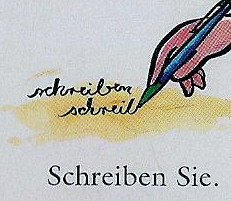|
Adjectives
describe or modify nouns. In German they agree in gender and number with the noun they modify.
Their endings also depend on the case (Nominative, Genitive, Dative, Accusative).
Study the table, read, listen, repeat and write your own sentences.
 + +  + +  Singular
We use the: Nominative to answer the question „wer ? = who ?“ (for persons) or „was ? = what ?“ (for things).
Example: Wer schreibt das Buch? – Die kluge Frau. = Who is writing a book? – The clever woman.
Genitive to answer the question „wessen ? = whose ?“ (for persons).
Example: Wessen Buch ist das? – Das ist das Buch des klugen Mannes. = Whose book is this?
Dative to answer the question „wem ? = whom ?“.
Example: Wem gehört das Buch? – Dem klugen Kind. = To whom belongs this bokk?
Accusative to answer the question „wen ? = who ?“ (for persons) or „was ? = what ?“ (for things).
Example: Wen rufst du an? – Die kluge Frau. = Who are you calling?
|
